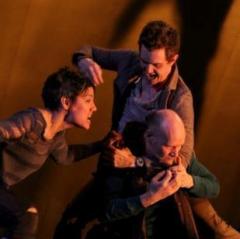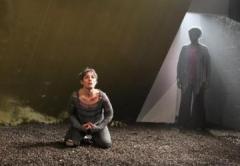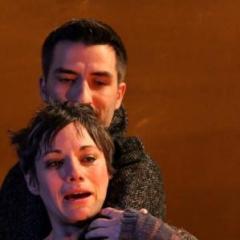
Paulanne Simmons
|
A New Look at an Ancient Tragedy "Electra"
When you take out the interference of the gods and the Trojan war, Sophocles’ "Electra" is at heart a family drama. The king of Argos is (or was until his wife murdered him) the head of a quintessentially dysfunctional family. Phoenix Theatre Ensemble certainly gets this right in its current production of the ancient drama. "Electra" is set in Argos a few years after the Trojan war. Agamemnon has been killed by his wife Clytemnestra, partly because she has taken his cousin, Aegisthus, as a lover and partly in revenge for his sacrifice of their. daughter Iphigenia. In all fairness, he had only killed their daughter to appease the enraged goddess of the unborn, Artemis, who caused intense winds to stop his ships after one of his soldiers killed a pregnant hare. But Clytemnestra, who also has to contend with his new mistress, Cassandra, is intransigent.
Her son and daughter, Orestes and Electra, see things somewhat differently. Electra thinks her mother is an abusive slut. She spends her days brooding, waiting for her brother, whom she has hustled out of Argos after his father’s throne was usurped, to return from Phosis and avenge their father’s murder. "Electra" begins when Orestes comes back to Argos, seeking revenge with the help of his friend Pylades and his tutor, Pedagogus, It is impossible today to reconstruct exactly how the Greeks staged their plays. We’re still not even sure what parts were sung or spoken. But the problem "Electra" poses for modern productions is that it is composed almost entirely of explanations and arguments over how people view past events and the appropriateness of various courses of action.
Clytemnestra argues with Electra. Electra argues with her sister. The chorus argues with everyone. But very little actually happens until the ending, when bloody vengeance takes its toll. Phoenix Theatre Ensemble has used an excellent translation by Anne Carson. Director Amy Wagner, with the help of scenic and lighting designer Maruti Evans, has made sure the story is not encumbered by extraneous trappings. A screen is set at an angle with the stage floor, made of pebbles and rocks. This creates some nifty shadows. But she has not given the actors enough to do onstage. Kelli Holsopple is excellent in the title role. Part just avenger, part narcissistic adolescent, unkempt and ill-clad, she gives a very physical representation of her inner turmoil. Her interactions with Morgan Rosse as her sister, Chrysothemis, are particularly convincing. Page Clements is an energetic if not very subtle Clytemnestra. Wagner has also made some puzzling choices. Why does Pylades (Jon-Michael Miller) speak in sign language? Why do the characters burst into Greek every once in a while? Do we really need to be reminded this is a Greek play? And why do we see violence onstage, something forbidden by Greek tradition? If this "Electra" seems to be too thought-out in some ways and not enough in others, ii does have moving scenes between the various characters that emphasize the horrible breakdown in family relations. And that, after all, is at the heart of this tragedy. |
| museums | NYTW mail | recordings | coupons | publications | classified |



